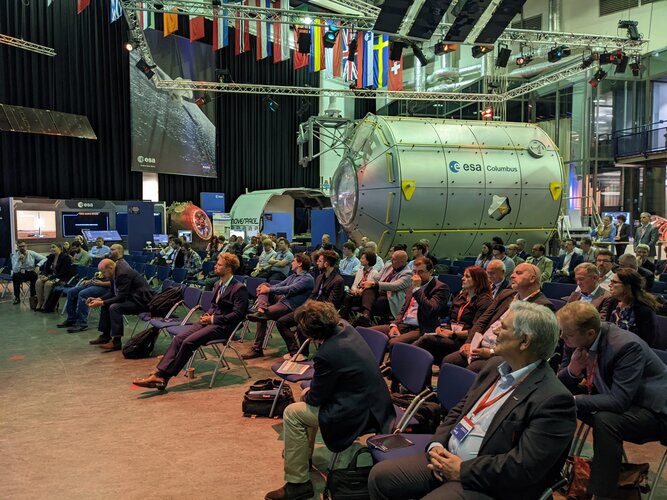
Copernical Team
Vega-C pre-launch press briefing
 Video:
00:43:03
Video:
00:43:03
Watch the replay of the Q&A session with the media to learn more about the preparations for the upcoming launch of Vega-C. The inaugural flight of this new rocket in the Vega family is currently planned on 13 July 2022. Speakers include Stefano Bianchi, ESA Head of Flight Programmes Department, Benoit Pouffary, ESA Vega & Space Rider Launch System Engineering Manager, Ettore Scardecchia, Avio Head of Engineering and Mario Cosmo, ASI Director of Science and Research.
Smart competition for clever navigation at NAVISP Industry Days

Europe’s leading companies and research institutes working on positioning, navigation, and timing (PNT) technologies met at ESA’s technical heart in the Netherlands in mid-June for this year’s NAVISP Industry Days, devoted to the latest developments in the Agency’s Navigation Innovation and Support Programme.
Why Does the Inside of the Solar System Not Spin Faster
 The motion of a tiny number of charged particles may solve a longstanding mystery about thin gas disks rotating around young stars, according to a new study from Caltech.
These features, called accretion disks, last tens of millions of years and are an early phase of solar system evolution. They contain a small fraction of the mass of the star around which they swirl; imagine a Saturn-like
The motion of a tiny number of charged particles may solve a longstanding mystery about thin gas disks rotating around young stars, according to a new study from Caltech.
These features, called accretion disks, last tens of millions of years and are an early phase of solar system evolution. They contain a small fraction of the mass of the star around which they swirl; imagine a Saturn-like AIR and Nigerian Space Agency sign MOU to collaborate on agriculture monitoring
 On July 4, 2022, the Aerospace Information Research Institute (AIR), Chinese Academy of Sciences (CAS) signed a memorandum of understanding (MOU) in Beijing through an online event with the National Space Research and Development Agency (NASRDA) of Nigeria to boost collaboration on crop monitoring with the goal to help the country achieve Zero Hunger goal, which is among 17 sustainable developme
On July 4, 2022, the Aerospace Information Research Institute (AIR), Chinese Academy of Sciences (CAS) signed a memorandum of understanding (MOU) in Beijing through an online event with the National Space Research and Development Agency (NASRDA) of Nigeria to boost collaboration on crop monitoring with the goal to help the country achieve Zero Hunger goal, which is among 17 sustainable developme Synspective releases First Image from its Small SAR Satellite "StriX-ss" that captures 3 cities around the world
 Synspective Inc., a SAR satellite data and analytic- solution provider, announced that it has successfully acquired its first image from its second SAR satellite, "StriX-ss".
"StriX-ss" was launched by Rocket Lab's Electron from New Zealand's Mahia Peninsula launch site on March 1, 2022 (JST) and put into target orbit at an altitude of 561km in a sun-synchronous orbit (SSO). Since then, it
Synspective Inc., a SAR satellite data and analytic- solution provider, announced that it has successfully acquired its first image from its second SAR satellite, "StriX-ss".
"StriX-ss" was launched by Rocket Lab's Electron from New Zealand's Mahia Peninsula launch site on March 1, 2022 (JST) and put into target orbit at an altitude of 561km in a sun-synchronous orbit (SSO). Since then, it Airbus to provide 42 satellite platforms and services to Northrop Grumman for the US Space Development Agency program
 Airbus U.S. Space and Defense, Inc., has been contracted to provide 42 satellite platforms as well as assembly, integration, and test (AIT), launch, and space vehicle commissioning support services to Northrop Grumman to satisfy the U.S. Space Development Agency's (SDA) Tranche 1 Transport Layer prototype constellation (T1TL) award.
The Transport Layer will serve as the backbone for SDA's
Airbus U.S. Space and Defense, Inc., has been contracted to provide 42 satellite platforms as well as assembly, integration, and test (AIT), launch, and space vehicle commissioning support services to Northrop Grumman to satisfy the U.S. Space Development Agency's (SDA) Tranche 1 Transport Layer prototype constellation (T1TL) award.
The Transport Layer will serve as the backbone for SDA's Kleos Space invests for future growth in the UK
 Kleos Space Ltd, the UK subsidiary of Kleos Space S.A., is to set up operations at the Space Park Leicester, a world-leading hub for innovative research, enterprise and education in space and
earth observation. Kleos is a 'space-powered' Radio Frequency Reconnaissance Data-as-a- Service (DaaS) and Mission-as-a-Service (MaaS) provider.
The new UK facility will provide access to a buoy
Kleos Space Ltd, the UK subsidiary of Kleos Space S.A., is to set up operations at the Space Park Leicester, a world-leading hub for innovative research, enterprise and education in space and
earth observation. Kleos is a 'space-powered' Radio Frequency Reconnaissance Data-as-a- Service (DaaS) and Mission-as-a-Service (MaaS) provider.
The new UK facility will provide access to a buoy China rejects 'concern' by NASA chief about Beijing militarizing the moon
 The Chinese government hit back on Tuesday at the head of the American space program over remarks he made in an interview that suggested Beijing is seeking to militarize the moon.
NASA Administrator Bill Nelson criticized China in the interview with German newspaper Bild and said there should be concern about Chinese efforts to explore the moon.
"We must be very concerned that Ch
The Chinese government hit back on Tuesday at the head of the American space program over remarks he made in an interview that suggested Beijing is seeking to militarize the moon.
NASA Administrator Bill Nelson criticized China in the interview with German newspaper Bild and said there should be concern about Chinese efforts to explore the moon.
"We must be very concerned that Ch Carnegie Mellon is reimagining nanosatellite capabilities with orbital edge computing
 Researchers at Carnegie Mellon University's College of Engineering are setting out on a mission to reimagine the capabilities of nanosatellites in low-Earth orbit.
Backed by a $7 million grant from the National Science Foundation's (NSF) Cyber-Physical Systems (CPS) Frontiers Program, the CMU initiative will transform constellations of nanosatellites into sophisticated distributed computin
Researchers at Carnegie Mellon University's College of Engineering are setting out on a mission to reimagine the capabilities of nanosatellites in low-Earth orbit.
Backed by a $7 million grant from the National Science Foundation's (NSF) Cyber-Physical Systems (CPS) Frontiers Program, the CMU initiative will transform constellations of nanosatellites into sophisticated distributed computin Rocket Lab to launch responsive space missions for National Reconnaissance Office
 Rocket Lab USA, Inc (Nasdaq: RKLB) reports its next two launches will be responsive space missions for the United States Government's National Reconnaissance Office. Launching from Rocket Lab Launch Complex 1 on two Electron rockets, Rocket Lab is scheduled to deploy satellites to space for the NRO within only 10 days of each other. NROL-162 ("Wise One Looks Ahead") will launch from Rocket Lab L
Rocket Lab USA, Inc (Nasdaq: RKLB) reports its next two launches will be responsive space missions for the United States Government's National Reconnaissance Office. Launching from Rocket Lab Launch Complex 1 on two Electron rockets, Rocket Lab is scheduled to deploy satellites to space for the NRO within only 10 days of each other. NROL-162 ("Wise One Looks Ahead") will launch from Rocket Lab L 